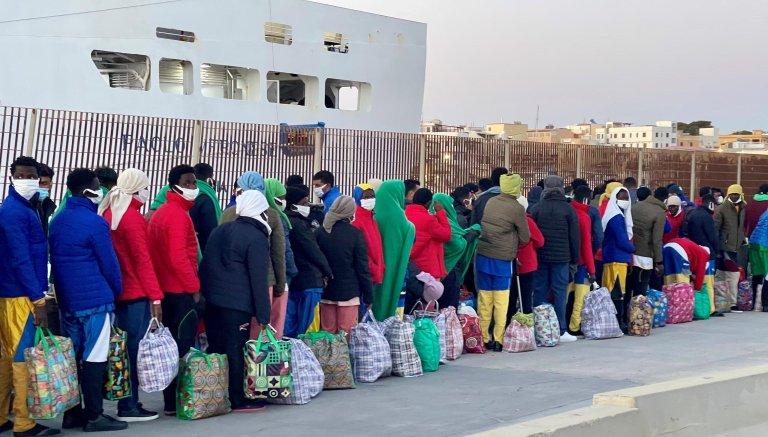Italy, France, and Germany have announced a joint initiative aimed at streamlining the repatriation of migrants, marking a significant step in European cooperation on migration management. The three countries, facing mounting pressure to address irregular migration flows, are coordinating efforts to enhance the efficiency and fairness of return procedures. This collaboration reflects a shared commitment to balancing humanitarian concerns with border control measures, amid ongoing debates over migration policies across the continent.
Italy France and Germany strengthen collaboration for migrant repatriation efforts
Italy, France, and Germany have announced a renewed partnership aimed at enhancing and streamlining migrant repatriation procedures across their borders. This strategic alliance focuses on improving coordination between their immigration authorities, facilitating quicker identification processes, and boosting the logistical support required to return migrants to their countries of origin safely and efficiently. Officials from all three nations emphasized that this joint effort is driven by a shared commitment to uphold legal frameworks while addressing humanitarian concerns. The collaboration also involves expanding data-sharing mechanisms to better track repatriations and reduce irregular entries within the Schengen area.
Key initiatives outlined by the trio include:
- Joint task forces operating at key border points to ensure harmonized enforcement.
- Enhanced outreach programs in countries of origin to promote voluntary returns.
- Investment in new technologies such as biometric systems to verify identities rapidly.
A preliminary report released last month highlights the impact of coordinated efforts over the past six months:
| Country | Migrants Repatriated | Voluntary Returns | Pending Cases |
|---|---|---|---|
| Italy | 3,200 | 1,150 | 450 |
| France | 2,800 | 1,320 | 380 |
| Germany | 4,100 | 950 | 520 |
Detailed challenges faced by the trio in coordinating cross-border migrant returns
Coordinating migrant returns across Italy, France, and Germany has exposed a complex web of logistical and diplomatic hurdles. One of the main difficulties lies in aligning the administrative frameworks and legal standards of three distinct countries, each with its own immigration policies and bilateral agreements. Communication breakdowns often occur between agencies responsible for screening migrants, verifying identities, and processing travel documentation. Added to this are challenges in securing cooperation from countries of origin, many of which are hesitant or slow to accept returnees due to political sensitivities or capacity constraints.
Operationally, the trio faces significant obstacles in arranging safe and dignified transport for migrants, particularly in cases involving vulnerable individuals such as unaccompanied minors or those with medical needs. The necessity of ensuring compliance with human rights standards complicates logistics, as authorities must incorporate additional safeguards and oversight mechanisms. Below is a summary table highlighting key challenges and their impacts:
| Challenge | Description | Impact |
|---|---|---|
| Legal Disparities | Varying national laws on asylum and readmission | Delays in processing and inconsistent return decisions |
| Diplomatic Barriers | Slow or reluctant cooperation from origin countries | Extended detention periods and overcrowded facilities |
| Logistical Complexities | Coordinating multi-country travel routes and documentation | Increased costs and lower return rates |
| Humanitarian Considerations | Ensuring protection for vulnerable migrants during returns | Need for specialized escorts and medical support |
Policy recommendations for improving efficiency and protecting migrant rights
To balance operational efficiency with the protection of fundamental human rights, it is crucial that European nations adopt a multifaceted approach. Streamlining bureaucratic processes through digital integration can significantly reduce delays in repatriation, while standardized protocols across borders prevent inconsistencies that often put migrants at risk. Cooperation among Italy, France, and Germany must prioritize transparent communication channels, ensuring that migrants receive timely and clear information about their rights and procedures. Additionally, embedding cultural sensitivity training for border officials can help safeguard dignity and reduce instances of discrimination or abuse.
Enhancing policy frameworks with robust guarantees is essential for safeguarding migrants throughout the repatriation process. These should include:
- Legal assistance and access to appeals, empowering migrants to contest decisions effectively.
- Regular monitoring by independent human rights bodies to ensure compliance with international standards.
- Safe and humane transport conditions, respecting health and safety norms during transfers.
- Post-repatriation support, facilitating reintegration into home communities to prevent marginalization.
| Policy Aspect | Recommended Action | Expected Outcome |
|---|---|---|
| Administrative Efficiency | Implement centralized digital case management | Faster processing times |
| Rights Protection | Mandatory legal aid provision | Reduced wrongful repatriations |
| Transparency | Public reporting on repatriation statistics | Increased accountability |
Wrapping Up
As Italy, France, and Germany join forces to enhance migrant repatriation efforts, the initiative marks a significant step in addressing migration challenges at the European level. While the collaboration aims to streamline processes and ensure orderly returns, it also raises complex questions about human rights and integration policies. As the situation develops, stakeholders and observers alike will be watching closely to assess the impact of this joint approach on migrants and host countries across the continent.




